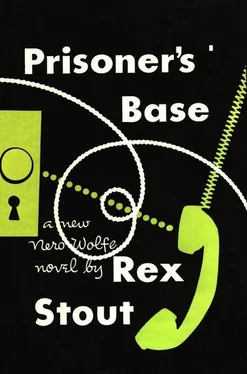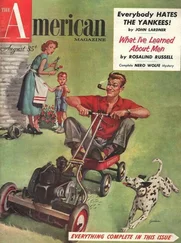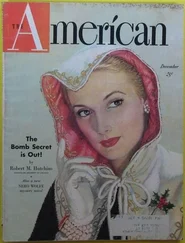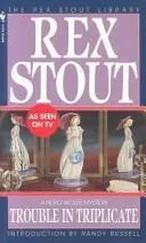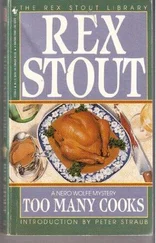He ignored it. “Get your notebook,” he growled. “If I’m saddled with this thing, I am. Your program for the morning.”
I obeyed.
Probably my conception of a widow was formed in my early boyhood in Ohio, from a character called Widow Rowley, who lived across the street. I have known others since, but the conception has not been entirely obliterated, so there is always an element of shock when I meet a female who has been labeled widow and I find that she has some teeth, does not constantly mutter to herself, and can walk without a cane.
Mrs. Sarah Jaffee was not visibly burdened with any handicaps whatever. She was probably more than one-third the age Widow Rowley had been, but not much. That much, along with the shock, took only one good glance as she admitted me to her sixth-floor apartment on East Eightieth Street, and the glance also furnished another mild shock. Although it was ten in the morning of a pleasant and sunny June day, there in her foyer was a man’s topcoat thrown carelessly over the back of a chair, and on a polished tabletop was a man’s felt hat. I kept my brows down, merely remarking to myself, as she led me though a large and luxurious living room, that since I had phoned for permission to come, and so was expected, it might have been supposed that a widow would have taken the trouble to tidy up a little.
When, beyond the living room, we came upon a table in an alcove with breakfast tools in place for two, I will not say that I blushed, but I felt that I had not been properly briefed.
“I was in bed when you phoned,” she said, sitting and picking up a spoon. “I assume you’ve had breakfast, but how about some coffee? Sit down — no, not there, that’s my husband’s place. Olga! A coffee cup, please!”
A door swung open and a Valkyrie entered with a cup and saucer in her hand.
“On a tray, my pet,” Mrs. Jaffee said, and the Valkyrie whirled and disappeared. Before the door had stopped swinging she breezed in again with cup and saucer on a tray, and I backstepped not to get trampled. When she had gone I got my coffee from my hostess and went to a chair on the other side. She took her spoon and scooped a bite of melon.
“It’s all right,” she said, reassuring me. “I’m a nut, that’s all.” She opened wide for the bite of melon, and there was no question about her having teeth, very nice ones. I took a sip of coffee, which was barely drinkable for a man used to Fritz’s.
“You know my husband is dead,” she stated.
I nodded. “So I understood.”
She took another bite of melon and disposed of it. “He was in the Reserve, a major, a Signal Corps technician. When he went away, one day in March a year ago, he left his hat and coat there in the hall. I didn’t put them away. When I got word he had been killed, three months later, they were still there. That was a year ago, and there they are, and I’m sick of looking at them, I’m simply sick to death of looking at them, but there they are.”
She pointed. “There’s his breakfast place too, and I’m sick of looking at that. Weren’t you surprised when I told you on the phone, all right, come ahead? You, a complete stranger, a detective wanting to ask me questions about a murder?”
“A little, maybe,” I conceded, not to be cranky.
“Of course you were.” She dropped a slice of bread into the slot of the toaster and spooned another bite of melon. “But at that I lost my nerve. A while back I decided to quit being a nut, and I decided the way I would do it — I would have a man do it for me. I would have a man sit here with me at breakfast, in Dick’s place — my husband’s place — and I would have him take that awful hat and coat out of that hall. But do you know what?”
I said I didn’t.
She finished the melon, popped the toast out, and started putting butter on it before telling me what. “There wasn’t a man I could ask! Out of all the men I know, there wasn’t one that would have understood! But I was determined it had to be done that way, so there I was. And this morning, when you phoned, I was all shaky anyway, it was so horrible about Pris, the way she died, and I thought to myself, This man’s a stranger, it doesn’t matter whether he understands or not, he can sit and eat breakfast with me and he can take that coat and hat out of there.”
She turned her palms up and made a face. “And did you hear me?” She mimicked herself. “‘I assume you’ve had breakfast — no, not there, that’s my husband’s place.’ I just simply lost my nerve. Do you suppose I really am a nut?”
I arose, circled the end of the table, sat in the chair at her right, took the napkin, picked up the plate and extended my arm, and demanded, “That piece of toast, please?”
She goggled at me a full three seconds before she moved a hand for the toast, slow motion. The hand was quite steady.
“Excuse me,” I said, “but I suppose I ought to eat it if you want this to stick, and it’s that godawful cellophane special, so if there’s any jelly or marmalade or honey...”
She got up and left through the swinging door. In a little she was back with an assortment of jars on a tray. I selected one that was labeled plum jam and helped myself. She made another piece of toast, buttered it and took a bite, and poured more coffee for us. She ate the last crumb of toast before she spoke.
“If you hadn’t been rude about the bread I would soon have been crying.”
“Yeah, I thought so.”
“Will you take that coat and hat away with you?”
“Certainly.”
She was frowning at me. She put out a hand as if to touch my arm, then withdrew it. “Do you mean to say you understand?”
“Gosh, no, I’m just a stranger.” I pushed my coffee cup back. “Look, Mrs. Jaffee, it’s like this. Nero Wolfe is investigating the murder of Priscilla Eads for a client. As I told you on the phone, we have no idea that you know anything at all about the murder, directly or indirectly, but you may have information that will help. You inherited from your father ten per cent of the stock of Softdown, Incorporated, and for a time you were Priscilla Eads’s closest friend. Isn’t that right?”
“Yes.”
“When did you see her last?”
She used her napkin on lips and fingers, dropped it on the table, pushed back her chair, and arose. “We’ll be more comfortable in the other room,” she said, and moved. I followed, through to the living room, where it was cooler, with the slanted Venetian blinds admitting only a dim and restful light. The furniture was all wearing light blue slipcovers that looked as if none of them had been sat on yet. After she had got cigarettes from an enameled box and I had lit them, she perched with cushions on an oversized divan, looking less than ever like Widow Rowley, and I took a chair.
“You know,” she said, “my mind is a very funny thing. I guess there’s no doubt I’m a nut. When you asked me just now about seeing Pris, when I saw her last, I realized for the first time that someone did it.”
“Did what? Killed her?”
She nodded. “I didn’t hear about it until late yesterday afternoon, when a friend told me on the phone. I never see an evening paper, and I haven’t looked at this morning’s paper yet, and anyhow I probably wouldn’t read about it because I can’t stand things like that. I seem to just shut my eyes to things I can’t stand. So I knew Pris was dead, found dead in her apartment, strangled, but that was all. When you asked me when I saw her last, it hit me all of a sudden that someone actually did it! She didn’t do it herself, did she?”
“Not unless somebody helped out by removing the cord for her afterward. She was strangled with some kind of cord.”
Читать дальше
